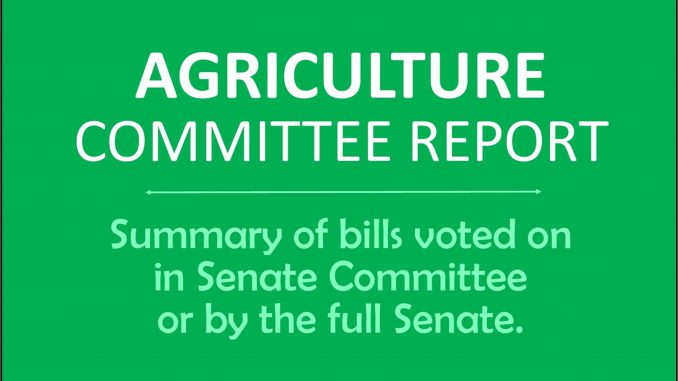
SCR 7 – Multilateral trade agreements with U.S., Canada & Mexico
SF 519 – Agricultural production facility trespass
FLOOR ACTION:
SCR 7 – Multilateral trade agreements with U.S., Canada & Mexico
SCR 7 is a resolution recognizing the importance of multilateral trade agreements between the U.S., Canada and Mexico, and urging the U.S. Congress to enact legislation to implement them.
[3/13: Voice Vote (Absent: T. Taylor; Vacant: Danielson)]
SF 519 – Agricultural production facility trespass
SF 519 creates a criminal offense of “agricultural production facility trespass” for a person who, through an act of deception:
- Obtains access to an agricultural production facility that is not open to the public, with the intent to cause physical or economic harm.
- Obtains employment at an agricultural production facility with the intent to cause physical or economic harm.
A person who commits agricultural production facility trespass is guilty of a serious misdemeanor for the first offense and an aggravated misdemeanor for a second or subsequent offense. A person who conspires with another to commit agricultural production facility trespass is guilty of a serious misdemeanor for the first offense and an aggravated misdemeanor for a second or subsequent offense. The bill is effective upon enactment.
In 2012, the new crime of “agricultural production facility fraud” was created by the Legislature after several industrial farm investigations brought national attention to Iowa’s agricultural industry. Lawmakers described the bill—commonly known as the “ag gag” law—as responsive to two primary concerns of the agricultural industry: facility security (biosecurity/security of private property) and harms that accompany investigative reporting.
The 2012 law outlaws (a) obtaining access to an agricultural production facility by false pretenses and (b) making a false statement or representation as part of a job application at such facility, if the person knows the statement to be false, and making the statement with intent to commit an act not authorized by the owner of the facility, knowing the action is not authorized. A collection of groups, including the ACLU, challenged the 2012 law in court. A recent 2019 ruling by federal Judge James Gritzner overturned the law.
[3/12: 41-8 (No: Bolkcom, Celsi, Hogg, Jochum, Lykam, Mathis, Petersen, Quirmbach; Vacant: Danielson)]
